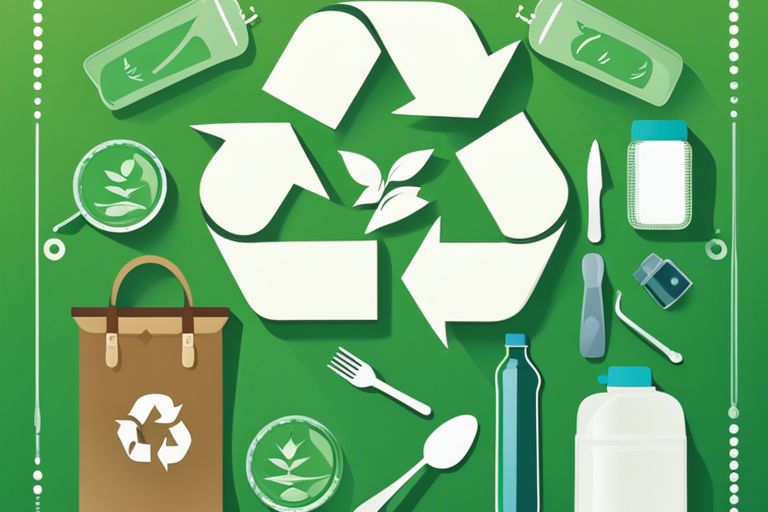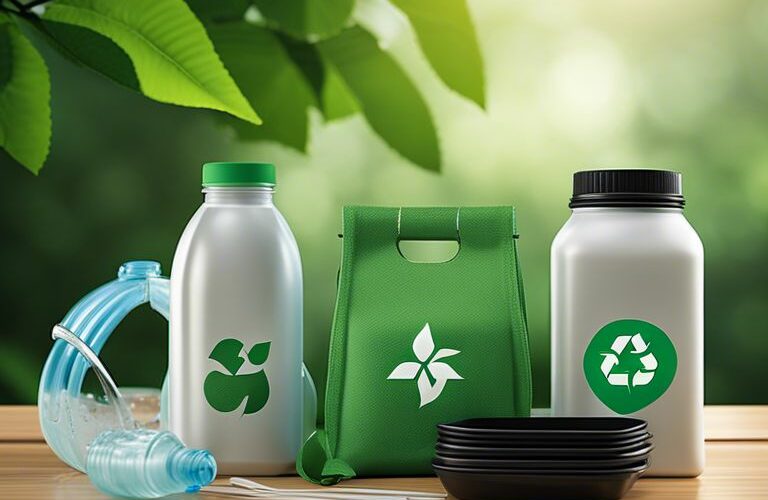Reducing waste is crucial for the environment, and adopting a zero-waste lifestyle is a powerful way to contribute positively to the planet. In this guide, we will explore important hacks for beginners to kickstart their journey towards reducing waste and embracing a more sustainable lifestyle. From simple swaps to mindful practices, we will cover effective tips to help you minimise your environmental impact and work towards a greener future. By making small changes in your daily habits, you can make a significant difference in the fight against waste and pollution. Let’s begin this transformative journey towards a more eco-friendly existence.
Table of Contents
Getting Started with Zero-Waste
Embarking on a zero-waste lifestyle can seem daunting at first, but with the right approach, anyone can reduce their waste significantly. By making small changes to your daily habits and choices, you can make a big difference in the amount of waste you produce. This chapter will guide you through the initial steps of transitioning to a zero-waste lifestyle.
Assessing Your Current Waste
Before you can start reducing your waste, it’s crucial to understand what you’re currently throwing away. Take some time to audit your household waste by sorting through your rubbish bin. Identify which items are most commonly discarded and consider alternative options for disposal. This exercise will give you a clearer picture of your waste habits and where you can make improvements.
Once you’ve assessed your current waste, think about the areas in your life where you can make the most significant impact. Whether it’s reducing food packaging, cutting down on single-use plastics, or minimising paper waste, pinpointing your main sources of waste will help you prioritise your efforts.
Easy Tips to Start Reducing Waste Today
1. Swap disposable items for reusable alternatives, such as cloth bags for shopping and stainless steel straws for drinks.
2. Shop in bulk to reduce packaging waste and bring your own containers to store items.
- Avoid buying products with excessive plastic packaging
This simple swap can significantly decrease the amount of waste you create on a daily basis. By investing in durable, reusable items, you can eliminate the need for single-use disposable products completely.
Zero-Waste in the Kitchen
Reducing waste in the kitchen is a crucial step towards living a more sustainable lifestyle. By making small changes to how we shop, cook, and dispose of food, we can significantly reduce our environmental footprint and work towards a zero-waste lifestyle.
How to Shop with Less Packaging
When shopping for groceries, opt for loose produce rather than items wrapped in plastic or packaging. Bring your own reusable bags and containers to the store to avoid using single-use plastic bags. Choose products in glass containers or buy in bulk to reduce packaging waste. Look for stores that offer refill stations for items like grains, oils, and cleaning products to minimise packaging waste even further.
Composting for Beginners
Composting is a fantastic way to reduce food waste and create nutrient-rich soil for your garden. Start by setting up a compost bin in your kitchen for fruit and vegetable scraps, coffee grounds, and eggshells. Remember to avoid adding meat, dairy, or oily foods to your compost as these can attract pests and slow down the composting process. As your compost pile grows, remember to turn it regularly to aerate the mixture and speed up decomposition.
Composting may seem daunting at first, but once you get the hang of it, it becomes a simple and rewarding process. By diverting organic waste from landfills, you are not only reducing methane emissions but also creating a valuable resource for your garden.
Zero-Waste Personal Care
Concerning reducing your waste in personal care, there are several zero-waste hacks that can make a big difference. From choosing sustainable hygiene products to embracing DIY zero-waste beauty solutions, there are plenty of options to help you on your journey to a more environmentally friendly lifestyle.
Choosing Sustainable Hygiene Products
One of the first steps towards zero-waste personal care is choosing sustainable hygiene products. Look for items like biodegradable toothbrushes, refillable deodorants, and reusable cotton pads. Avoiding single-use items and opting for products with minimal packaging can significantly reduce your environmental impact.
DIY Zero-Waste Beauty Solutions
Embracing DIY zero-waste beauty solutions is another great way to reduce your waste. You can make your own all-natural skincare products using ingredients like coconut oil, shea butter, and vital oils. Not only are these options better for the environment, but they are also healthier for your skin as they eliminate harsh chemicals found in many conventional beauty products.
By making your own beauty products, you have full control over what goes into them, ensuring that they are tailored to your specific needs. Plus, you can reduce packaging waste by storing your creations in reusable containers or refillable jars.
Beyond the Home: Zero-Waste on the Go
Living a zero-waste lifestyle shouldn’t stop when you leave the house. It’s important to carry your eco-friendly habits into the outside world to truly make a difference. Whether you’re travelling or at work, there are plenty of ways to reduce waste while on the go.
How to Travel Without Creating Waste
Travelling can often lead to a lot of waste, from single-use plastic bottles to disposable cutlery. To travel without creating waste, bring a reusable water bottle and fill it up at water fountains or refill stations. Pack your own snacks in a reusable container to avoid buying food in plastic packaging. Invest in a good quality travel mug for hot drinks on the go to avoid single-use cups.
Another tip is to research zero-waste or eco-friendly travel options at your destination. Look for accommodations that support sustainability practices, and choose tour operators that are committed to reducing their environmental impact. By being prepared and mindful of your choices, you can minimise waste while exploring the world.
Zero-Waste Workplace Strategies
Concerning reducing waste at work, there are several strategies you can implement to make a difference. Start by using digital tools to reduce paper waste, such as online documents and emails instead of printouts. Encourage your colleagues to bring reusable containers for lunches and snacks to avoid disposable packaging. Set up recycling stations and compost bins in the office to properly dispose of waste.
Embrace the concept of a paperless office by digitising files and processes wherever possible. Consider implementing a zero-waste policy in the workplace to promote sustainability among employees. By taking small steps and being consistent in your efforts, you can significantly reduce the amount of waste generated in a work environment.
Zero-Waste Workplace Strategies are vital for creating a sustainable work environment. By prioritising eco-friendly practices and promoting a culture of sustainability, workplaces can become more environmentally conscious and reduce their carbon footprint. Implementing these strategies not only benefits the planet but also contributes to a healthier and more ethical work atmosphere.
Overcoming Common Challenges
Factors That Can Sabotage Your Zero-Waste Efforts
When begining on your zero-waste journey, it’s important to be aware of certain factors that can derail your efforts. One common challenge is the convenience of single-use items that are deeply ingrained in our daily routines. Disposable products such as plastic water bottles, coffee cups, and straws can easily tempt us when we’re on the go or in a rush.
- Temptations: Being seduced by the convenience of single-use items
- Social Pressure: Facing criticism or ridicule from peers for your zero-waste choices
- Old Habits: Struggling to break free from wasteful practices you’ve grown accustomed to
Knowing how to anticipate and overcome these hurdles is key to staying on track with your zero-waste goals. By recognising the factors that can sabotage your efforts, you can proactively find solutions to counteract them and stay committed to your sustainable lifestyle choices.
Tips for Staying Motivated in Your Zero-Waste Journey
Establishing a routine and setting achievable goals are fundamental to maintaining your motivation throughout your zero-waste journey. It’s important to celebrate the small victories along the way, whether it’s successfully implementing a new zero-waste habit or inspiring others to follow suit.
- Routine: Incorporating eco-friendly practices into your daily schedule
- Goals: Striving towards specific, measurable objectives in your zero-waste efforts
The journey towards zero waste is a marathon, not a sprint. The consistent effort you put in today will contribute to a brighter, cleaner future for generations to come. The resolve and passion you demonstrate in reducing waste serve as a beacon of hope and inspiration for others to join the movement towards a more sustainable world.
- Commitment: Dedicate yourself to making a positive impact on the environment
- Inspiration: Seek motivation from like-minded individuals and environmental success stories

How To Reduce Your Waste – Zero-Waste Hacks For Beginners
In the long run, reducing waste and adopting a zero-waste lifestyle is crucial in combating environmental issues like pollution and climate change. By following simple yet effective hacks such as refusing single-use items, embracing reusables, composting organic waste, and shopping mindfully, beginners can make a significant impact. Taking small steps towards reducing waste not only benefits the planet but also promotes sustainable living practices for a greener future. It is vital for everyone to play their part in minimising waste generation to create a healthier and cleaner environment for generations to come.
FAQ
Q: What is zero waste?
A: Zero waste is a lifestyle that aims to reduce the amount of waste we send to landfills by reusing, recycling, and composting to minimise our environmental impact.
Q: Why is reducing waste important?
A: Reducing waste is important as it helps to conserve resources, protect the environment, and reduce pollution, ultimately leading to a more sustainable future for our planet.
Q: How can I start reducing my waste?
A: You can start reducing your waste by refusing single-use items, opting for reusable alternatives, and composting organic waste to divert it from landfills.
Q: What are some zero-waste hacks for beginners?
A: Some zero-waste hacks for beginners include carrying a reusable water bottle, using cloth bags for shopping, and buying products in bulk to reduce packaging waste.
Q: How can composting help in reducing waste?
A: Composting helps in reducing waste by turning organic material into nutrient-rich soil instead of sending it to the landfill, where it would release harmful greenhouse gases.

Our contributing author is a passionate advocate for eco-friendly living and sustainability. With a background in eco-life, they are dedicated to inspiring and empowering individuals to adopt environmentally conscious lifestyles. Through insightful articles, they share practical tips, innovative solutions, and thought-provoking perspectives to promote a greener, more sustainable world. Join them on the journey towards eco-smart living and discover how small choices can make a big impact. 🌱








